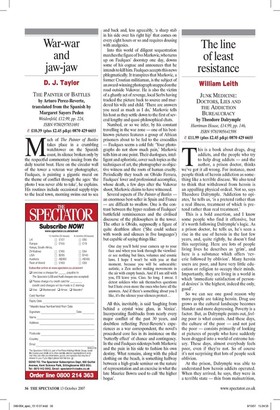War-war and jaw-jaw
D. J. Taylor THE PAINTER OF BATTLES by Arturo Perez-Reverte, translated from the Spanish by Margaret Sayers Peden Weidenfeld, £12.99, pp. 224, ISBN 9780297851691 © £1039 (plus £2.45 p&p) 0870 429 6655 Much of The Painter of Battles takes place in a crumbling watchtower on the Spanish coast, its silence broken only by the respectful commentary issuing from the daily tourist boat. Here on the circular wall of the tower a veteran war photographer, Faulques, is painting a gigantic mural on the theme of conflict through the ages: `the photo I was never able to take', he explains. His routines include occasional supply-trips to the local town, morning swims out to sea and back and, less agreeably, 'a sharp stab in his side over his right hip' that comes on every eight hours or so and requires dousing with analgesics.
Into this world of diligent sequestration marches the figure of Ivo Markovic, who turns up on Faulques' doorstep one day, downs some of his cognac and announces that he intends to kill him Faulques accepts this news phlegmatically. It transpires that Markovic, a former Croatian militiaman, is the subject of an award-winning photograph snapped on the road outside Vukovar. He is also the victim of a ghastly act of revenge, local Serbs having tracked the picture back to source and murdered his wife and child. 'There are answers you need as much as I do,' Markovic tells his host as they settle down to the first of several lengthy and quasi-philosophical chats.
Numbed, or so we infer, by his constant travelling in the war zone — one of his bestknown pictures features a group of African prisoners about to be fed to the crocodiles — Faulques seems a cold fish: 'Your photographs do not show much pain,' Markovic tells him at one point. Their duologues, intelligent and aphoristic, cover such topics as the techniques of art, the photographer as objective witness and the roots of human cruelty. Periodically they touch on Olvido Ferrara, Faulques' lover and professional accomplice, whose death, a few days after the Vukovar shoot, Markovic claims to have witnessed.
Several aspects of The Painter of Battles — an enormous best-seller in Spain and France — are difficult to swallow. One is the contrast between the hyper-realism of Faulques' battlefield reminiscences and the civilised discourse of the philosophers in the tower. The other is Olvido, supposedly a figure of quite deathless allure (She could seduce with words and silences in five languages') but capable of saying things like: One day you'll hold your camera up to your face and when you look through the viewfinder see nothing but lines, volumes and cosmic laws. I hope I won't be with you at that moment, because you will be unbearable: autistic, a Zen archer making movements in the air with empty hands. And if I am still with you, I'll leave you. Ciao. So long. I swear. I detest soldiers who ask themselves questions but I hate even more the ones who have all the answers. And if there's something about you I like, it's the silence your silences protect...
All this, inevitably, is said 'laughing from behind a crystal wine glass, in Venice'. Incorporating flashbacks from nearly every major conflict of the past 30 years, and doubtless reflecting Perez-Reverte's experiences as a war correspondent, the novel's procedural core lies in its insistence on the 'butterfly effect' of chance and contingency. In the end Faulques sidesteps both Markovic and the pain in his side to fashion his own destiny. What remains, along with the piled clothing on the beach, is something halfway between a high-grade seminar on the nature of representation and an exercise in what the late Maurice Bowra used to call `the higher bogus'.



































































 Previous page
Previous page